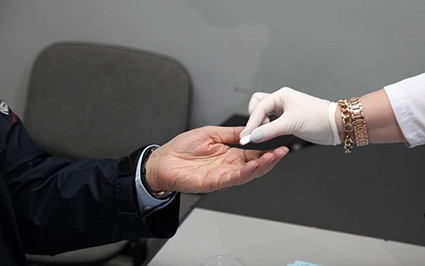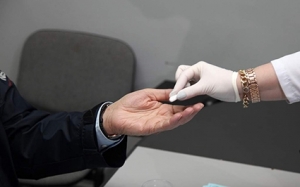Hepatitis C is Curable, Stigma is the Real Killer
“An often overlooked and painful component of HCV is stigma. Although invisible, stigma is a harsh reality. For some, the stigma of HCV hurts more than HCV itself. Stigmas hurt all of us. We may not all have HCV, but we all live with it.” Lucinda K.Porter. From the book Free from Hepatitis C.
The contours of goodness of this truly unique elimination program of Hepatitis C are becoming visible. Apart from successful medical results, this illness is becoming less and less associated purely with intravenous drug abuse or other socially unacceptable actions for the Georgian population. The virus is mainly transmitted through contact with the blood of an infected person, which might happen at the dentist, during a blood transfusion procedure, or tattooing. The vacuum around Hepatitis C is breached by informational campaigns, through which ordinary citizens become aware of what Hepatitis C is truly about and what the scale of its spread is. Above all, there is hope that treatment is no longer inaccessible, and that is already a reality.
Doctor of Biology Temur Radiani is not sure exactly when he became infected with Hepatitis C. In the late 90s he cut his foot on some glass and had a couple of operations. Apparently, the reason the virus got into his blood was a poorly sterilized medical instrument. As in most cases, Temur found out about his virus accidentally in 2007, when complaining to his doctor about a gallbladder problem. His Hepatitis results turned out positive.
Temur lives in the center of Tbilisi. He takes the prescribed medical preparation Sofosbuvir once every two weeks in the Hospital of Infectious Diseases in the capital. These pills must save his life. The treatment is successful. Temur Radiani is one of the first patients to switch to the state elimination program and declared it openly on television.
“Some two years ago nobody could imagine that somebody would talk about the virus openly. Everyone held back from coming out. And it was even more unbelievable to get treatment free of charge as the course costs tens of thousands of dollars. Nonetheless, an unprecedented thing happened: with the support of company Gilead and the U.S. National Center of Disease Control and Prevention, the government took responsibility for treating those infected. Today, in a country where the world index of Hepatitis C spread is terrible, people have a real chance of getting cured from this awful disease.”
The joint research conducted in 2002 by the John Hopkins University and the Center of Aids and Clinical Immunology of Georgia revealed 200 thousand infected people. The results of the new study on C and B Hepatitis will become public in the near future. According to the elimination plan, the state will take care of treating Hepatitis C until the patient is cured. In the first stage of the elimination program, 3200 patients have already begun treatment.
Keep in mind that 130 to 170 million people are infected with Hepatitis C worldwide. And 350 thousand people die from the virus annually.
Our respondent cannot hide his emotions. “When I first heard about the virus, I was shocked. I always led a healthy lifestyle; I loved walking in nature and couldn’t understand how I got infected... At first, just thinking about it made me feel uneasy. I didn’t want to see the results, as I knew that the costs of the treatment would prevent me from starting treatment- until 2007 treatment was totally inaccessible and after 2007, due to the high cost, treatment was accessible but only to the few. The second unpleasant thing was that in this country, where everyone is everyone’s friend and relative, Hepatitis was associated with drug abuse,” recalls Temur Radiani, adding that the patients currently undergoing treatment should not limit themselves to taking the highly effective preparation Sofosbuvir, but should be actively involved in the elimination process as well.
While Temur’s wife treated us to sweets, we observed their family photos hanging on the wall - the coryphaeus of Georgian literature, Temur is the son of famous specialist and critic of Georgian literature - Shalva Radiani.
“They say the elimination program was introduced just in time, as a lot of us had no perspective at all; we were predestined. But now I see that if you strictly follow all recommendations of your doctor the illness is curable. The stigma around this illness is being broken down, too, which helps people and families as they regain hope. We should all openly talk about Hepatitis C- there is nothing to hide.”
The Minister of Labor, Health and Social Affairs of Georgia, Davit Sergeenko, confirms that the problem of Hepatitis C, which is no longer regarded as a problem of individual countries and, due to its extended scale, is considered as one of the important global challenges of health care, can be overcome. But this requires three factors to happen simultaneously: treatment (effective and accessible for the patient), prevention (reduction of new cases to a minimum) and raising information awareness.
To our question on what results have been achieved since the elimination program began (on 21 April), Davit Sergeenko answers: “Before the start of the elimination program we wanted to find a couple of patients who would start talking about their illness openly and give an example to other patients. We searched for a long time, but everyone refused – they were heavily stigmatized because of it. This had its own reasons: first of all – Hepatitis C was associated with specific risk groups, and the social attitude towards it was negative. Secondly, the treatment was practically inaccessible for the population, which thought that because there was no cure, it made no sense revealing the illness.
Currently, more than 3 000 patients are undergoing treatment and, apart from the high index of their recovery, we are also witnessing an important social change whereby the stigma is being overcome: dozens of people have begun sharing their experience with others, which is highly welcomed and very important for the successful realization of the project.”
“On the behalf of dozens of people I can only be thankful to those who made the treatment of Hepatitis C accessible; to the doctors – who often work selflessly, and to the patients as well, who show patience throughout the difficult process of treatment,” said Temur Radiani before we left.
And we promised to see him in a month, by which time his virus should have been defeated.
Irma Kakhurashvili












